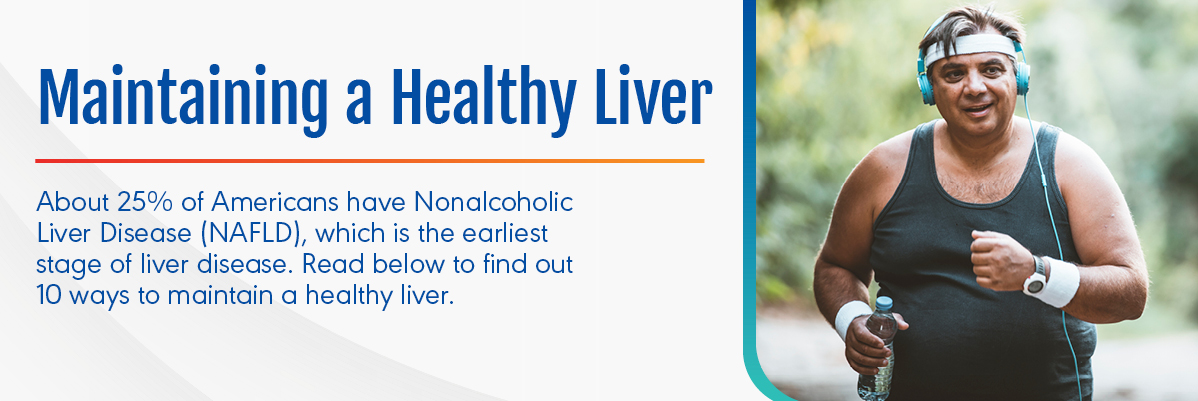
Most of us don’t give much thought to liver health, but with 25% of American adults estimated to have Nonalcoholic Liver Disease (NAFLD), we need to be aware of it. Also known as fatty liver, NAFLD is the earliest stage of liver disease. It is the most common chronic liver disease in the United States. Even more alarmingly, 20% of those with NAFLD have the more severe form called Nonalcoholic Steatohepatitis (NASH). This type of hepatitis means the liver is not only fatty, but it is also swollen or inflamed. Liver cell damage occurs in patients with NASH.
What Is Fatty Liver?
About the size of a football, your liver filters everything you put into your body. Along with detoxifying your blood, it produces bile to help break down fat. The liver also produces, stores and releases glucose.
Although it is normal for the liver to contain some fat, it should be less than 5% to 10% of your liver weight. You have a fatty liver if it’s more than that. It can be caused by excessive alcohol consumption or a wide range of conditions, such as obesity, metabolic syndrome, high cholesterol, diabetes or Hepatitis C. The liver can usually take quite a lot of abuse before problems start to arise, but this also means serious damage can occur before you know your liver is in danger. Despite the liver’s resilience, you cannot live without one, which is why maintaining liver health is so important.
There is no medical treatment available for fatty liver, but both alcoholic and nonalcoholic fatty liver diseases are reversible with lifestyle changes. Whether you have been diagnosed with fatty liver or you want to prevent it, here are 10 tips for keeping your liver in the best possible health.
Eat A Healthy Diet
Eat a nutritious, balanced, whole-foods diet. That means avoiding processed carbohydrates and sugars, saturated fat and salt; and filling up on fresh fruits, vegetables, whole-grains, protein, dairy and healthy fats.
Avoid Weight Gain
Maintaining a healthy weight will help decrease your risk of developing fatty liver disease. A good rule of thumb is a body mass index in the normal range (18-25), but speak to your doctor for guidance on a healthy weight for your body type.
Get Regular Exercise
Exercise not only helps to keep you in shape, but it also burns triglycerides, which can reduce the amount of fat stored in liver cells.
Limit Your Alcohol Consumption
Watch how much you drink. The U.S. government guidelines recommend no more than one drink per day for women and two drinks for men. Although, recent global studies suggest there are no safe levels of alcohol consumption.
Be Careful With Medications
Some prescription medications like statins or steroids can cause liver damage, while over-the-counter medications (such as acetaminophen and nonsteroidal anti-inflammatory drugs) can also cause liver damage if you take too much or if you drink alcohol while taking them. Always read the warning labels, and speak with your pharmacist if you have concerns.
Prevent Hepatitis
Learn how to prevent hepatitis, and get vaccinated. If you think you may have come in contact with the virus, get tested. There are several types of viral hepatitis that can all cause liver disease.
Drink Coffee
Research shows that drinking coffee reduces your risk of liver disease. The protective benefits increase with each cup up to 4 cups daily, regardless of whether you drink regular or decaf.
Avoid Toxins
Limit direct contact with toxins, such as cleaning products, insecticides and chemicals. Wear gloves when handling toxins, and wear a mask or ensure that you are in a well-ventilated area.
Consider Supplements Cautiously
Some dietary supplements can harm your liver. Conversely, some supplements claim to help restore liver health. Always discuss usage of supplements with your doctor, especially if you are on prescription medication.
Get Regular Check-Ups
Prevention is key when it comes to liver disease, so take advantage of annual wellness exams. A simple blood test is often the first step to identifying liver disease, even before any symptoms develop.
The physicians at GastroIntestinal Specialists, A.M.C., treat multiple conditions and diseases of the GI tract. Our Board-Certified team has over 150 years of combined experience in providing quality care that you can trust. To schedule an appointment, call (318) 631-9121 or click here.
